ISLAMABAD: Chief Justice of Pakistan Gulzar Ahmed on Monday asserted that no one under the ambit of law would be allowed to undermine the independence of the judiciary enshrined in the Constitution.
“The Constitution mandates in its preamble that the independence of the judiciary shall be fully secured,” observed the CJP while speaking at the opening ceremony of new judicial year 2020-21.
The ceremony was also addressed by Attorney General Khalid Jawed Khan, Pakistan Bar Council (PBC) vice chairman Abid Saqi and Supreme Court Bar Association president Syed Qalb-e-Hassan.
The Supreme Court chief justice said that neither justice could be delivered nor the fundamental rights of people protected unless judges were fully independent and under no external pressure.
The statement from the top adjudicator at this crucial juncture attains significance against the backdrop of widely accepted perception about the shrinking space for dissent and authority of the legal system, commented a senior counsel on condition of anonymity.
Says this year has been most challenging due to coronavirus pandemic
The CJP emphasised that under the Constitution and the law, no one was allowed to undermine the independence of judiciary, assuring that in the times to come, the judiciary at all levels would continue striving to uphold the supremacy of the Constitution to foster justice in all circumstances and ensure the rule of law in the country.
Referring to the concept of the judicial year, he said this occasion held great significance as it provided an opportunity to scrutinise the past performance, celebrate successes, discover shortcomings and ascertain the reasons to set new goals and devise new policies to achieve such objectives.
The chief justice asked why the courts were so very important for the functioning of the constitutional system and why the courts were tasked with protecting people’s basic and fundamental rights. He then went on to answer these by saying that “ours is a government of laws, not of men. Yet, laws, on their own, are of little use”.
The chief justice observed that every judge of the superior judiciary was under solemn oath to discharge duties honestly to the best of his ability and faithfully in accordance with the Constitution and the law and, in all circumstances, to do right to all manner of people, according to law, without fear or favour, affection or ill will.
“I must say that it is not only a privilege to be a judge but a heavy duty is cast upon judges, even under the oath, to preserve, protect and defend the Constitution, and not allow their personal interest to influence the official conduct or official decisions,” he observed.
The chief justice said this year had been one of the most challenging ones in the country’s history due to the coronavirus pandemic. Besides having been faced with other challenges like delay in disposal of cases, the pandemic posed a severe, unseen and intricate challenge to the court’s ability to function, he added.
“In the circumstances, we had to take wise and considerate decisions,” he said, adding that one among those was whether the court should remain open. Indeed, many, if not most, courts around the world chose to shut themselves off from the public, he said.
Referring to the overall institution and disposal of cases in the apex court, the chief justice said a total of 42,138 cases were pending at the beginning of the judicial year. During the pre-coronavirus period, about 8,817 fresh cases were instituted and about 6,752 decided. During the post-Covid-19 period, 7,046 cases were filed and 5,792 decided, leaving the closing balance of 45,455 cases.
“With the zeal to clear the backlog, judges volunteered to forego most of their vacations and continued to perform their duties. By adopting such measures, about 12,544 cases were disposed of during the previous judicial year,” the chief justice said.
Similarly, during the pre-Covid-19 period, from Sept 1, 2019 to Feb 29, 2020 (153 working days), 173 model criminal trial courts decided 21,553 murder and narcotic cases. During that period, 152 model trial magistrate courts decided 61,795 cases, while 119 model civil appellate courts decided 33,502 cases. In this way, total 444 modal courts, in all, decided a massive number of 116,850 cases in just 153 days. The pandemic has also hampered the progress of model courts. During the period between March 1 and Sept 11 this year, 437 modal courts could decide 16,487 cases in about 154 days.
Published in Dawn, September 15th, 2020















































